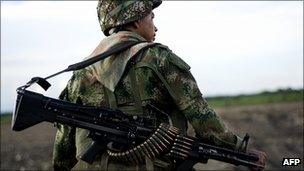Colombia's Farc rebels destroy radar station
- Published

Colombian troops are pursuing the rebels through the remote mountainous region
Farc rebels in Colombia have destroyed a radar installation, disrupting civil aviation in the south and west of the country, the government says.
Around 100 guerrillas bombarded the mountaintop installation with home-made missiles, killing one of the police guards and and smashing the equipment.
Officials said it would take several months to repair the radar, which is also used to monitor drug trafficking.
President Juan Manuel Santos has condemned the attack.
"When the Farc attacks sites that affect the civilian population it shows their weakness and desperation," he said.
Fierce battle
The radar station on Cerro Santana, in a remote mountainous area of the southern Cauca region, was under sustained attack for more than 12 hours.
Rebels bombarded the installations with gunfire and explosive missiles made out of cooking gas canisters.
The 18-strong police garrison fought back, supported by helicopter gunships. Army troops eventually arrived to restore control of the area and pursue the guerrillas.
The director of Colombia's civil aviation authority, Santiago Castro, said it could take months to repair the radar station, which controlled air traffic across a large area of southern and western Colombia.
"The solution we are considering to ensure the safety of flights is to space out their frequency. We don't know if the number of flights will have to be reduced, but there will be delays," Mr Castro said.
The disruption could also affect flights to neighbouring Panama and Ecuador.
The Revolutionary Armed Forces of Colombia (Farc) are the country's largest left-wing rebel group, and have been fighting since the 1960s.
In recent years they have suffered a series of setbacks, losing thousands of fighters and several of their top commanders.
But they remain a powerful force in large areas of rural Colombia, thanks in part to money gained from the cocaine trade.
Earlier this month the Farc's new leader - known as Timochenko - indicated that he was interested in peace talks with the government.
But President Santos has reiterated that there can be no negotiations until the rebels cease all attacks and release the hostages they are holding.
- Published11 January 2012
- Published10 January 2012
- Published7 December 2011
- Published27 November 2011